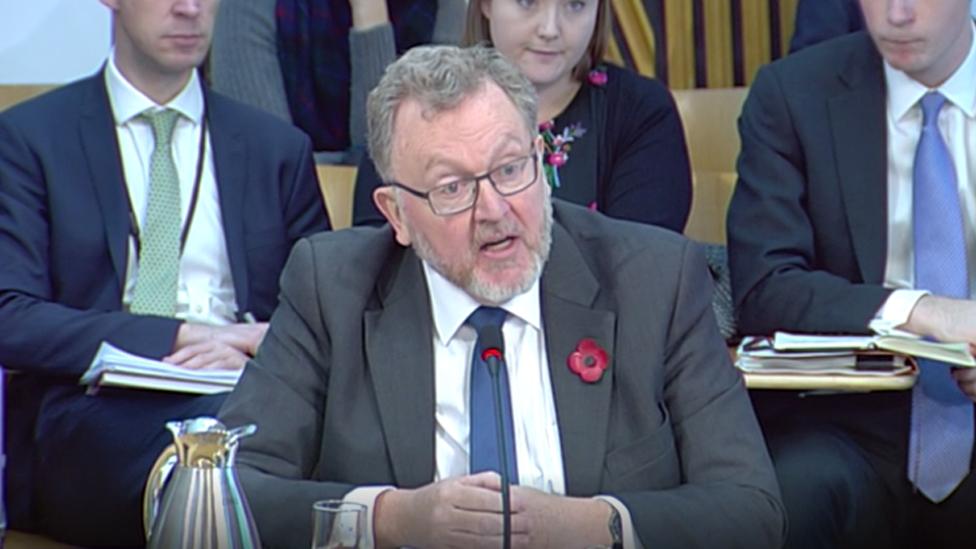EU trade 'linked to 134,000 Scots jobs'
- Published
- comments

Manufacturing is particularly dependent on EU trade
European Union trade routes are linked with 134,000 jobs in Scotland, according to new economic research.
The Fraser of Allander Institute says the figure is based on £12.3bn in 2015 exports into other parts of the EU.
More jobs are already linked with exports to other parts of the world, which the UK government wants to boost post-Brexit through new trade deals.
Some 560,000 Scottish jobs - one in four - are either directly or indirectly supported by UK sales.
That calculation suggests that trade with the rest of the UK is more than four times more important to Scots, in terms of jobs, than the rest of the European Union.
The report, from the economic institute at Strathclyde University, was commissioned by the GMB union.
The trade union believes it provides clear evidence that the UK government should publish its own impact assessments of Brexit.
These have been required by a vote of the House of Commons, but only a limited amount of government information has been supplied this week, and MPs are demanding ministers explain why so much is being withheld.

The drinks sector has a bigger role in Scotland's economy than it does elsewhere in the UK
The report also suggests that some exporting sectors are significantly more important to the Scottish economy than they are to the UK as a whole.
The drinks sector, led by whisky, is second most important in EU sales, after oil and chemicals. However, it ranks number 19 to the UK.
Fish and shellfish exports are third most important by value for Scotland, but in the UK ranking of EU exports, fish are in 31st place.
Between 2016 and 2017, seafood sales to the EU were valued at £633m, or 78% of the industry's total exports.

Analysis by Douglas Fraser, BBC Scotland business and economy editor

The jobs in this latest Brexit assessment are reckoned to be dependent on trade.
It would be wrong to assume that they will disappear, just as it would be wrong to assume that a job supported by sales to other parts of the world will be more secure under future trading deals.
It would also be wrong to hang too much on the actual numbers, as opposed to the general picture. The economists who compiled it acknowledge that the data behind this research is thin in places.
What the report shows is the starting point for a period of likely upheaval, in which the future trading relationships between Scotland and the rest of the UK, and much more so between the UK and the rest of the world, are re-aligned - perhaps radically so.
It's likely some sectors will suffer, and jobs will be lost. Others will grow.
Some may be vulnerable to new trade deals, if, for instance, competition is opened up between British agriculture and more efficient North American prairie farmers.
Other industries may thrive if Britain chooses to protect them, or if it has the ability (which is not guaranteed) to give them extra support. That could include the defence sector, shipbuilding, or pharmaceuticals.
We don't know any of this, because the shape of Brexit remains foggy. For now, most economists see the downside of this upheaval, or re-alignment of the British economy, being much more significant than any upsides.
There are, at least, two lessons for Scotland. One is a reminder that trading with the rest of the UK is far more important, economically, than trade with the EU or with the wider world.
The flipside of that argument: if nearly two-thirds of all sales outside Scotland are to the rest of the UK, that's a very heavy dependency on an economy which is in pretty poor shape, and the case for diversifying markets is strong.
What this report also highlights is how different sectors and parts of the country have distinct interests in EU trade negotiations that are not aligned with the national picture for the UK as a whole.
That will matter when, or if, negotiators get to talks about a future trade deal between the EU and the UK. The most important sector for the UK, in terms of current trade patterns with the EU, is in car manufacturing. So you could reasonably assume negotiators will give that priority.
The deal done to reassure Nissan, soon after the Brexit referendum, is one that other sectors would like - whatever it was.
For Scotland, it is important to ensure continued seamless market access for whisky, salmon and langoustine, which feature prominently on the UK negotiators' sonar screen. If we are soon to start trade talks, that sectoral battle for attention will become a more prominent part of the Brexit process.

The GMB warns that will make it more difficult to ensure these strategically important industries have the fullest support of British negotiators.
Gary Smith, Scottish secretary of the union, commented: "Our concern is for 134,000 jobs and £12bn in trade with Europe - what steps have been taken to protect the interests of jobs and the Scottish economy?
"We know the Conservative government has taken action to protect the automotive industry down south. They won't publish the detail, but they've taken steps to protect Nissan in Sunderland.
"We've asked the Secretary of State for Scotland: what steps have they taken to protect Scottish jobs and Scottish interests. They've commissioned research, but refused to publish it.
"The first step is to get some transparency into the process. Publish the Brexit impact documents, tell us what they see as the threats in Scotland, because we're clear thousands of jobs are at risk. And then let's start taking steps to mitigate the risks to the Scottish economy and Scottish jobs, in crucial areas for us, like whisky and spirits."

Other findings from the Fraser of Allander report include:
In 2015, just over 60% of Scottish trade with the EU was from manufacturing, with almost all the rest from services.
Of the 134,000 jobs linked to Scottish exports to the EU, 80,000 were reckoned to be through direct employment links, 33,000 through indirect links (in the supply chain) and 21,000 through 'induced' effect, when firms and workers spend the money they've earned from EU contracts.
Some 196,000 jobs are thought to be linked to Scotland's international exports beyond the EU, and 560,000 in sales to the rest of the UK.
About 55,000 of the EU-linked jobs were in manufacturing and 73,000 in services.
In terms of job numbers, the finance and business services sector has 30,000 jobs with links to EU exports, distribution, hotels and catering has 22,000, food and drink has 13,000, metal and machinery has 11,000.
The sectors with the highest level of dependence on EU sales start with refined petroleum, chemicals and pharmaceuticals, with 27% of jobs, and for computing and electrical products, it is 21%.
About 1,000 enterprises in Scotland have a parent company from another EU country, employing a total of about 130,000 people.
Of Scotland's 10 major export destinations, six are in the EU, plus Norway and Switzerland are included within EU trading arrangements.
The GMB Scottish leader said there are also challenges for the Scottish government
"Scotland is between a rock and a hard place. We're exiting a large market. But the UK market is Scotland's biggest market, and half a million jobs depend on that," he said.
"The problem is that the UK market is slowing down. We're predicting 10 years more of low wage growth, which is going to mean we'll have very big problems in one of our key markets. That's a huge challenge for Scotland.
"So there is a question about what the Scottish government is going to do in terms of protecting jobs and creating investment in Scotland, in some of the key industries, where we've had problems, for instance the renewable energy sector. But the crunch question at the moment is for those around the negotiating table, which is the UK government."
- Published2 November 2017

- Published25 October 2017
